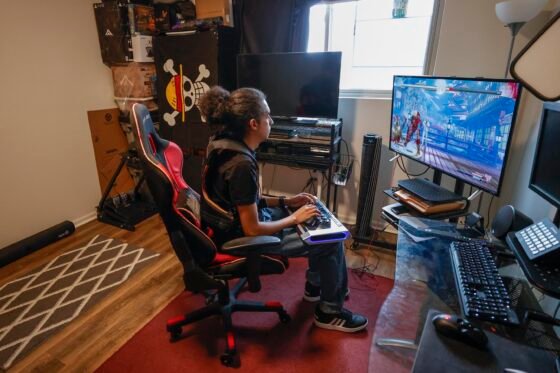
Controller adapted to gamers with reduced mobility, color customization, sound signals for blind gamers: Gamers with disabilities have multiple options to take full advantage of video games, but barriers remain.
†Accessibility should be part of the DNA of every employee in our company”, assures David Tisserand, responsible for these topics at Ubisoft. The aim of the French giant, which has around 19,000 employees worldwide, is to: “make sure everyone takes their responsibility and understands that it is their mission”insists Mr. Tisserand.
According to Microsoft estimates, 400 million players have disabilities, or nearly 15% of video game players worldwide. Long ignored by the industry, the issue of accessibility is now being raised by major studios, publishers and manufacturers, justifying this importance on ethical and financial grounds. Specialized sites and organizations have multiplied.
Since 2021, the Video Game Accessibility Awards will reward the titles most suitable for players with disabilities. The second edition, which took place in mid-March, was mainly dedicated to the Forza Horizon 5 racing simulation developed by Playground Games, the first game in history to support American and British sign language.
“The situation has improved a lot from what it was for decades as games can now be fixed with updates”underlines Chris Robinson, a “gamer” from Chicago, Illinois, deaf from birth, who hosts the DeafGamersTV channel on Twitch.
Recent games such as The Last of Us Part II (Naughty Dog), Marvel’s Guardians of the Galaxy (Eidos-Montréal), or Far Cry 6 (Ubisoft) have been praised by the disabled video game player community for their abundance of visual or sound parameters.
As for the accessories, Microsoft released a controller for Xbox in 2018 designed for players with motor disabilities that can modulate the controls and connect external peripherals developed by third-party manufacturers, such as those from the Swiss company Logitech.
obstacles
Despite this progress, too many games remain “small captions that cannot be adjusted and the background cannot be changed or provide visual cues to help deaf players”regrets Chris Robinson.
A sentiment shared by Soleil Wheeler, another deaf gamer, who has hundreds of thousands of followers on social media, where he uses the pseudonym Ewok and broadcasts his games of Fortnite and Apex Legends “battle royales”.
“The other challenge is being able to communicate with teammates who can hear”adds the 16-year-old, who dreams of seeing a feature appear that automatically generates captions to monitor verbal conversations between players.
For gamers with motor disabilities, cost remains one of the main barriers. The Xbox custom controller costs 100 dollars (90 euros) and on top of that is the price of switches, buttons or external joysticks, often custom made.
In addition, Nintendo and Sony, Microsoft’s two main competitors in the console market, currently do not offer an accessory equivalent to the Xbox interface.
“Sony has put a lot of effort into game accessibility, but this is more focused on sensory impairment than motor impairment”notes David Combarieu, founder of the Var-based start-up Hitclic, which offers solutions adapted to players with limited mobility.
“They’ve even complicated our lives with the PS5, which has compatibility issues with previous generations” of consoles, Mr. Combarieu, whose son-in-law, Théo Jordan, is paralyzed.
Standardization
Many players with disabilities express a desire to be more involved in the game creation process. “For developers, it’s ideal to have direct feedback rather than researching and trying to guess in their corner” the needs, explains Carlos Vasquez, aka Rattlehead, a blind “gamer” from Houston, Texas, who is adept at fighting games.
A very high level Mortal Kombat player, Mr. Vasquez, who can only be identified by sound, was approached a few years ago by NethermRealm Studios, which is developing the franchise. At his recommendation, the studio added sound signals to help blind players distinguish certain objects they can interact with.
Streaming platforms have helped to normalize handicaps within the gaming community. On forums and social networks, however, there are many aggressive or insulting comments, often made by an uninformed public.
“I know there will always be ‘trolls’ and ‘haters'” (Internet users who are supporters of systematic criticism or even intimidation), Ewok says. “But I won’t let them ruin my life and I prefer to choose my fights wisely.”
AFP